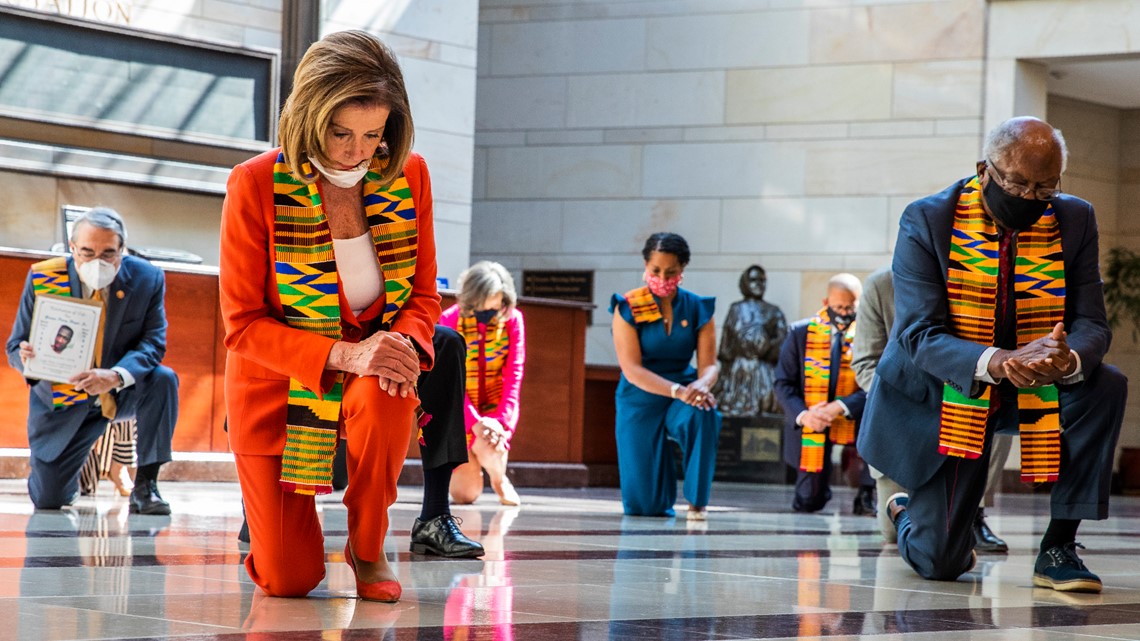WASHINGTON, D.C., USA — House Democrats in the House and Senate, including House Speaker Nancy Pelosi and other top Democrats, unveiled sweeping legislation that would overhaul policing the U.S. The "Justice in Policing Act of 2020" would ban police choke holds, create a national database of excessive-force incidents, and prohibit certain no-knock warrants.
The bill comes as the protests in the wake of George Floyd's death continue across the country and across the world. The proposed legislation would ban choke holds, including the kind police used against Floyd, killing him.
According to NBC News, the legislation has more than 200 Democratic co-sponsors in the House and Senate—Rep. Chellie Pingree of Maine is one of them.
“While policing happens at the local level, Congress must take the lead in enacting overdue law enforcement reforms to bring about structural change across the nation,” Pingree said in a statement.
“Unchecked racial bias and the well-documented use of force against Black Americans is a scourge on our country, and the lack of accountability from police departments is both outrageous and unacceptable," Pingree continued. "The Justice in Policing Act of 2020 would ban police from using the chokeholds and carotid holds which killed George Floyd, Eric Garner, and too many others whose stories we do not know. The bill would address the injustice of qualified immunity, which has allowed the police to evade consequences for the murder of Breonna Taylor and countless others. If lawmakers can decry racial injustice on social media and say ‘Black Lives Matter,’ they must join us in supporting this historic bill to protect the lives of Black Americans from police brutality.”
Before introducing the bill on Monday, senior Democrats kneeled in the Capitol, held a moment of silence, and read the names of George Floyd and others killed during police interactions. According to The Associated Press, they knelt for 8 minutes and 46 seconds, the length of time Floyd was pinned under a white officer's knee before he died.


"The martyrdom of George Floyd gave the American experience a moment of national anguish as we grieve for the black Americans killed by police brutality today," Pelosi said at a news conference Monday. "This moment of national anguish is being transformed into a movement of national action as Americans from across the country peacefully protest to demand an end to injustice."
Pelosi says the House will hold hearings and vote on the bill in the comings weeks. NBC News reports Democratic leaders "expressed confidence" that the bill would pass in the House, and that Pelosi hopes Senate Majority Leader Mitch McConnell (R-Ky.) would "swiftly" take it up.
A summary of what the proposed bill would do:
Hold police accountable in courts by:
- Amending the mens rea (intent) requirement in 18 U.S.C. Section 242, the federal criminal statute to prosecute police misconduct, from “willfulness” to a “recklessness” standard;
- Reforming qualified immunity so that individuals are not entirely barred from recovering damages when police violate their constitutional rights;
- Improving the use of pattern and practice investigations at the federal level by granting the Department of Justice Civil Rights Division subpoena power and incentivizing state attorneys general to conduct pattern and practice investigations;
- Incentivizing states to create independent investigative structures for police involved deaths through grants; and
- Creating best practices recommendations based on the Obama 21st Century Policing Task force.
Improve transparency into policing by collecting better and more accurate data of police misconduct and use-of-force by:
- Creating a National Police Misconduct Registry to prevent problem-officers from changing jurisdictions to avoid accountability; and
- Mandating state and local law enforcement agencies report use of force data, disaggregated by race, sex, disability, religion, age.
Improve police training and practices by:
- Ending racial and religious profiling;
- Mandating training on racial bias and the duty to intervene;
- Banning no-knock warrants in drug cases;
- Banning chokeholds and carotid holds;
- Changing the standard to evaluate whether law enforcement use of force was justified from whether the force was reasonable to whether the force was necessary;
- Limiting the transfer of military-grade equipment to state and local law enforcement;
- Requiring federal uniformed police officers to wear body cameras; and
- Requiring state and local law enforcement to use existing federal funds to ensure the use of police body cameras.
Make lynching a federal crime by:
- Making it a federal crime to conspire to violate existing federal hate crimes laws.
Here's where the rest of the Maine Delegation stands on the proposed bill:
Susan Collins:
Sen. Susan Collins (R-Maine) told NEWS CENTER Maine in a statement that the reform package includes provisions she supports, like "finally making lynching a federal crime and improving officer training around racial bias." She said she also supports the efforts to improve the use of pattern-or-practice investigations, which enable the Federal government to investigate police departments that have exhibited past incidents of racial bias.
"This discussion is long overdue, and making progress is a national imperative," Collins said.
"I am also encouraged that the Senate Judiciary Committee will be holding a bipartisan hearing on police use of force next week. I hope this legislation will be among the many proposals the Committee will be considering as we work towards achieving bipartisan consensus on this important issue."
Angus King:
A spokesman for Sen. Angus King (I-Maine) said, "The details on this bill were being finalized up to its release, so Senator King is going to review it and seek input from Maine people prior to making a final decision."
Jared Golden:
Rep. Jared Golden (D-Maine) is not one of the bills co-sponsors. Nick Zeller, a spokesman for Golden, told NEWS CENTER Maine, "He takes these issues seriously and will be spending the days ahead getting briefings from a range of experts, individuals, and organizations in an effort to fully understand what is in the bill as well as what isn’t."
“Congressman Golden believes that this country must act to address systemic racism and the inequalities in our criminal justice system," Zeller continued. "He believes that we must ensure accountability for unjustified use of force by police. We are facing long-term, complex, systemic problems that include racial, economic, and political inequalities, and the congressman is committed to the work necessary to find solutions and make progress on these issues in 2020.”
Last week, Golden released a statement in response to the protests that said, in part, "We must be firm in calling for accountability and justice but strongly committed to achieving both through actions that represent the values and ideals we wish to stand for - not only equality, liberty, and justice for all, but also respect and dignity for every human.”
Read the Justice in Policing Act of 2020 bill here:
RELATED: George Floyd funeral service updates & live coverage: Church doors open early for visitation
RELATED: Black Lives Matter protest schedules

